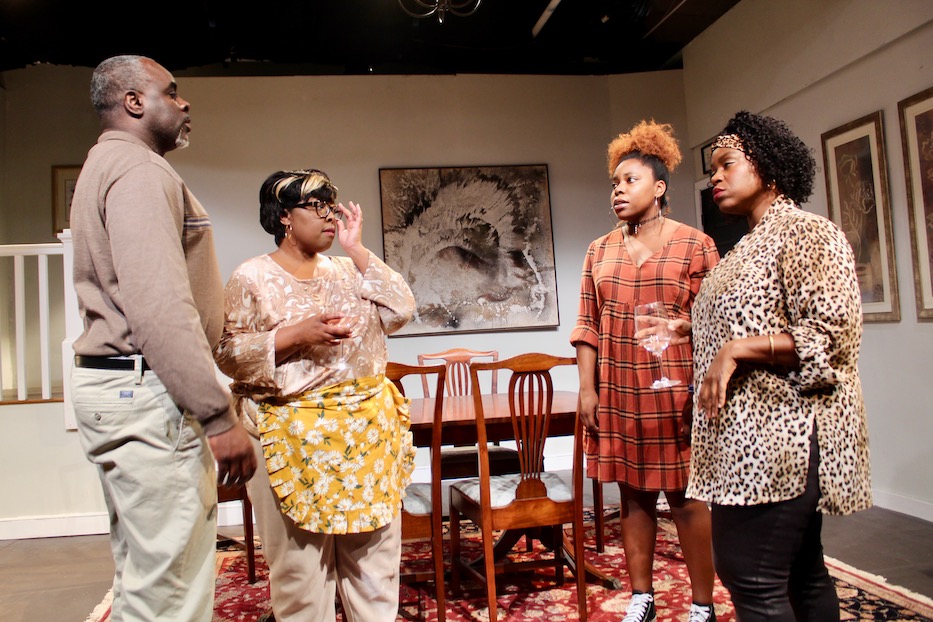
Collective Consciousness Theatre | Culture & Community | Erector Square | Fair Haven | Arts & Culture | Arts & Anti-racism
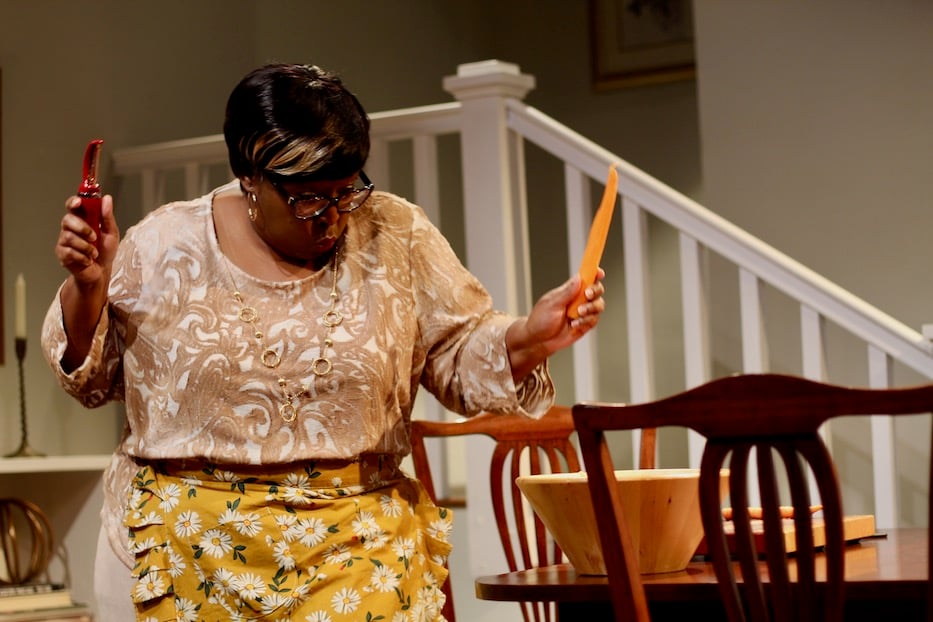
Jamie Guite as Beverly Frasier. Fairview runs at CCT through Nov. 19. Lucy Gellman Photos.
At first, Beverly Frasier is just nodding along to "Family Affair," a carrot poised in one hand and a peeler in the other. The music works its way into her hips and shoulders, the vocals buttery as they flow from a speaker. She smiles: for a minute, everything is right with the world.
But something is off: the track begins to skip, like one of those cassettes that’s been played one too many times. Mary J. Blige’s vocals come out chopped and layered, catching on themselves. Beverly is befuddled: her face begins to fall, then calms as the track evens out and begins to play again.
The scene—and its suggestion that everything may not be as it seems—brings the audience into Fairview, opening at Collective Consciousness Theatre this Thursday. Written by Jackie Sibblies Drury and directed by CCT’s Jenny Nelson, the play is a searing and on-point indictment of the white gaze and the construction of race and racism in America, as sharp and funny as it is right on time.
As it comes to New Haven, it is also quintessential Drury, with a fourth wall that creaks, cracks, wavers, and then comes tumbling down with brain-frying alacrity. Performances run Thursday through Saturday, Nov. 2 through 19, at CCT’s 319 Peck St. hub in Erector Square. Tickets and more information are available here.
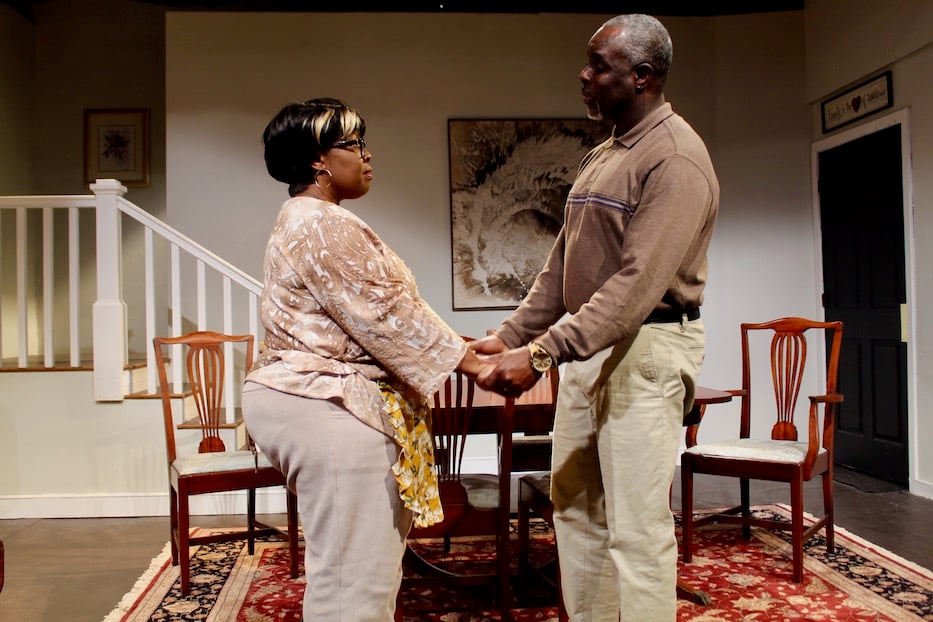
Jamie Guite as Beverly Frasier and Joshua Eaddy as Dayton.
“We’re excited to see audiences engage with this work,” Nelson said at a tech rehearsal on Tuesday night, moments before actors flooded an intimate set, and the show rolled into action. “It has similar themes like race, class, culture, appropriation, assimilation, colonization, but doing it in a way that I’ve never seen before. It’s a very innovative structure … some real secrets, twists and turns in this one.”
Set in what appears to be the present, Fairview opens on a seemingly uneventful Frasier home, as Beverly (Jamie Guite) prepares for her elderly mother’s birthday party, peeling carrots as music swirls around her. As Blige’s vocals fill the dining room, Beverly is feeling herself: she primps and poses as if she’s looking into a mirror, but she’s looking into the audience instead, giving them a window. Or maybe it’s a one-way mirror. The moment is fleeting: she soon remembers the mountain of cooking still left to do, and returns to the tasks at hand.
It’s not long before the audience meets her husband Dayton (Joshua Eaddy, in his CCT debut), who seems to know that there’s trouble brewing when she announces that guests will include her sister Jasmine (Marie R. Altenor) and brother Tyrone, an aspiring partner at a law firm who the audience never sees. Just mentioning their names sets the show into motion: Jasmine is soon there, brandishing a bottle of rosé, and so is Beverly’s teenage daughter Keisha (a show-stopping Kendall Driffin), setting down her history textbook as she greets her aunt on the couch.
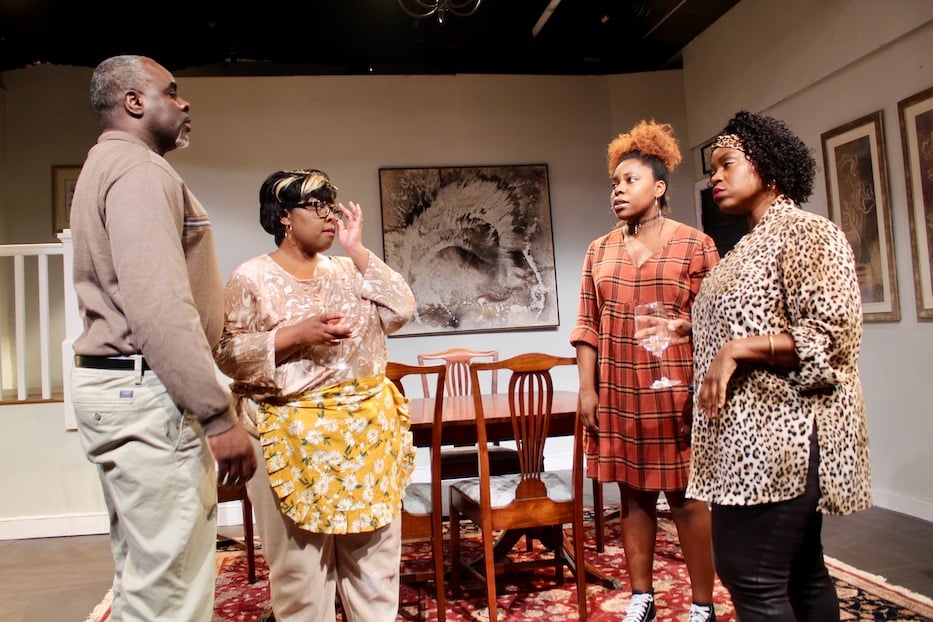
Joshua Eaddy as Dayton, Jamie Guite as Beverly, Kendall Driffin as Keisha, and Marie R. Altenor as Jasmine.
Like the song that plays the show in, it’s very much a family affair, and tensions simmer and sizzle between them, with small, nearly imperceptible glitches that start to add up. Characters speak, but they don’t always listen. Or they are summoned, and take entirely too long to come. Long before they ever sit down to eat, Beverly and Jasmine have slipped into a well-worn disagreement, their words barbed at the edges.
It seems that even the littlest thing might set them off: Beverly’s obsession with appearances, Jasmine’s fondness for predictable movies, Keisha’s palpable sense of overwhelm with the world. There’s something here that feels like a sitcom, except the laugh track is missing. By the time Dayton announces “Everything is gonna be fine! Don’t worry!” it seems like he’s in on the fact that there’s no universe in which that is entirely true.
But it’s how not fine, and why, and in what universe, that make the show impossible to look away from. For viewers who have seen Drury’s work in action (her 2012 We Are Proud to Present a Presentation About the Herero of Namibia, Formerly Known as Southwest Africa, From the German Südwestafrika, Between the Years 1884–1915, came to the Yale Cabaret in 2014 and to CCT in 2015), they might know to expect a script that will get chopped, rewound and twisted, with dream-like sequences that push the audience to question what universe they’re in.
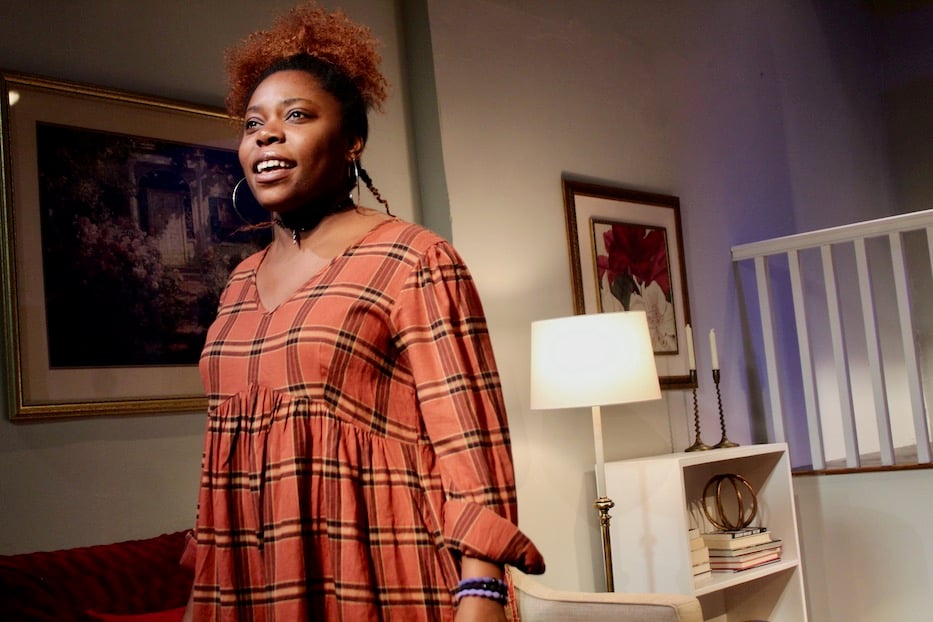
But Fairview stands completely on its own. Yes, there are many texts that weave in and out of this script, from Groundhog Day and The Cosby Show to Rhinoceros What to Send Up When It Goes Down (A Strange Loop also premiered Off-Broadway the same year that Fairview won a Pulitzer, and the works feel like they could be presented on a day-long double bill). And yes, all of them have a role to play, particularly as the first act melts into the second and third, and a family’s celebratory dinner melts into an uninvited puddle of stereotype.
But Drury’s writing feels like hers alone, with a keen sense of timing, of biting and incisive humor, of the blindness to colonialism and its brutal legacy that is being white. In her very Jackie Sibblies Drury-esque way, she is an expert at blurring the bounds between an audience’s notion of what is “regular” or “normal” (the Frasier’s orderly middle class home, not a couch cushion out of place) and what is actually normal (the world as it is, instead of the world as it could be).
In this sense, she deftly threads a social and historical needle, then lets it go entirely off the rails. And yet, at no point does it feel that far fetched. Instead, it becomes a case study in how Americans (and let’s be real, white Americans) construct, discount, codify, theorize, fuss over, and self-flagellate around race and racism, without actually challenging the systems of power that they have created and are, more often than not, trying very hard to maintain.
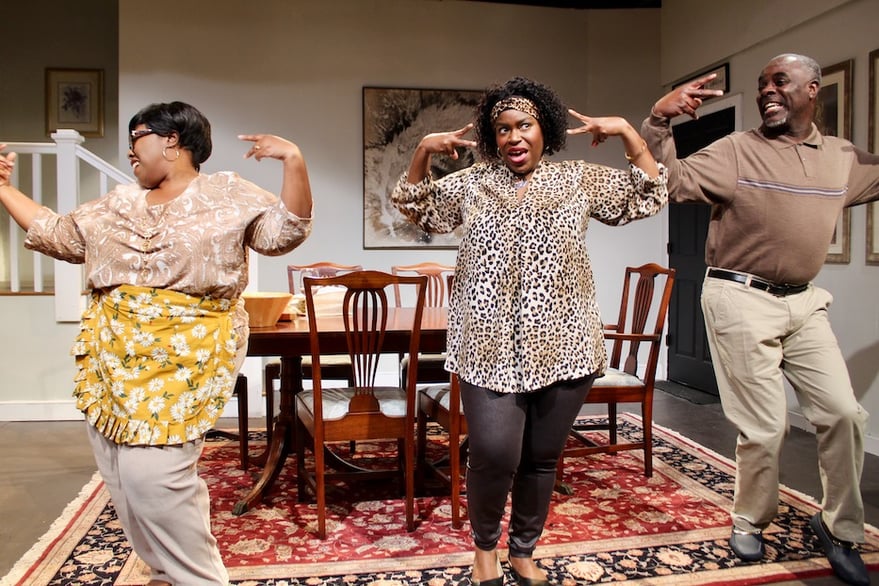
The cast is here for it, embracing a script that is as emotionally heavy as it is propulsive, and soars in their and Nelson’s able hands. Characters dance, and it’s as complex and layered as it is joyful (to say anything more would be to risk a series of mind-bending spoilers). They bicker, and it’s unclear what they’re actually bickering about, or who might be watching them, waiting in the wings to see what the next move will be. They synchronize and mute their patterns of speech and movement, and it becomes a reminder of history and bias, from which cultural stereotypes have been allowed to grow and propagate like weeds.
Just months after CCT presented Barbecue, cast members take Drury’s narrative twists and turns in stride, leaning all the way into them as time and space warp, and the fourth wall turns to dust. As Beverly, Guite plays the mom that many of us know (or maybe even had), who wants so much to have everything together that she simply makes herself believe that she does. There’s an internal battle there, and she shines most when she lets the audience see it, two parts of her at war.
As they orbit around her like frantic, agitated planets, both Eaddy and Altenor hold their own, with no stage direction that seems too absurd for them to pick up as they move through this show. That’s particularly true in acts two and three, as the Frasier matriarch comes down for the meal (again, to say much more would spoil the show) and extended family, or something like it, rolls in just in time for dinner.
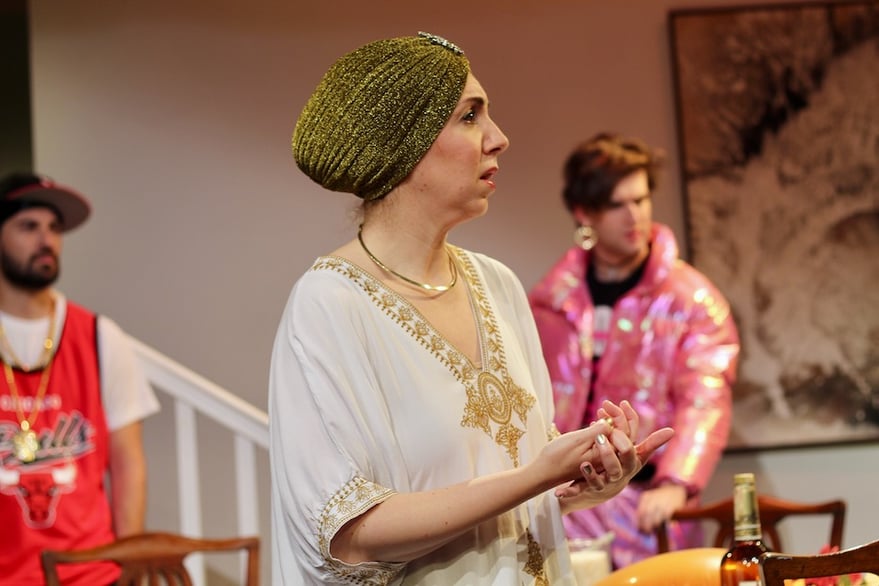
Lisa DeAngelis as Suze.
Around them, the Frasier home becomes a character itself, where no piece of furniture is out of place or goes unused for the entire show (a nod to set designer David Sepulveda, who has created an entire dining and living room, staircase, and swinging door that invite an audience into the space). In this off-kilter play, Sepulveda goes for normalcy, the sense and order of the scene part of its unraveling.
But it’s Driffin, who made her CCT debut in Barbecue earlier this year, who is the beating heart of the show. From the moment she appears onstage, Keisha is every bit her teenage self, with patterns of oh-so-high-school speech that Drury has nailed in her writing, and Driffin in her delivery. As Fairview‘s world becomes something of a fun house mirror, it’s Driffin who lives in that liminal space Drury so loves, squirming until she’s figured out how to make the audience squirm instead.
Her curiosity, which sometimes simmers into anger, is righteous and spellbinding to watch. Indeed, it’s as if she has been made to probe that whisper-thin barrier between the world of the play and the world thrumming outside of it, trying to see if they’re really so different at all.
In New Haven, where consumers of the fine and performing arts have remained startlingly, often uncomfortably white even as arts organizations have begun to diversify their programming, it raises questions that feel long overdue and very much worth asking. That’s true even at CCT, which was having these conversations before it was the fashionable thing to do.
Indeed, it’s not just Keisha’s final lines that hang in the air long after the play has ended, and audience members have made a decision about what side they want to be on. Instead, Fairview is a play for the moment, with questions that should follow one out to the parking lot and all the way home.
For instance—at what point do legacy institutions acknowledge that it’s time to say goodbye? At what point do they start charging a white person price?
When does leadership finally step back, and abdicate power that was never rightfully theirs?

